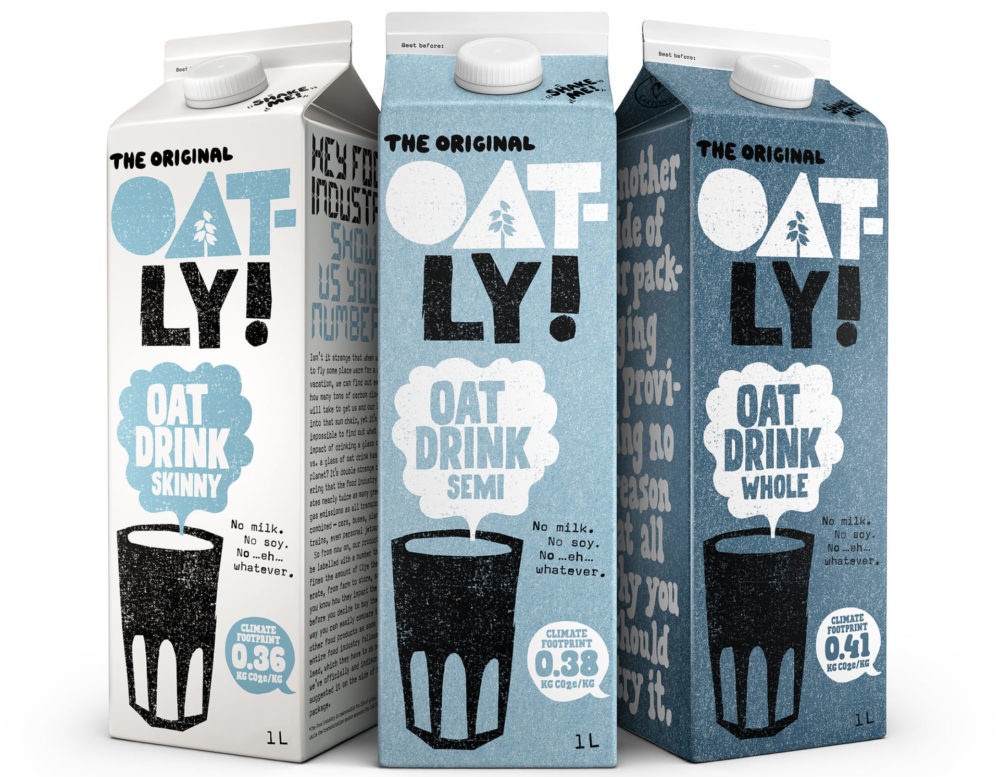Oatly, the Swedish oat milk company, started trading on the Nasdaq stock exchange today after raising $1.43 billion via an initial public offering that sold shares at $17 each, the top of its expected price range. Oatly is now valued at $13 billion after surging on its first day trading from an IPO valuation of $10 billion.
The deal bucks the recent downward trend in the public markets, which saw website development company Squarespace drop 9% in its first day trading on the New York stock exchange earlier this week. The Nasdaq has fallen 4.8% in May.
Oatly’s IPO lead underwriters, Morgan Stanley, JPMorgan Chase & Co. and Credit Suisse, will likely have promoted Oatly’s ESG credentials among investors who are reportedly struggling to find enough supply of publicly traded companies to fill ESG quotas. (This list of the most popular ESG stocks in 2020 is certainly controversial.)
(ESG stands for environment, social and corporate governance and refers to the three central factors in measuring the sustainability and societal impact of an investment in a company or business. Major investors including BlackRock have committed to ESG investing in the past 18 months.)
Oatly fits squarely into an ESG portfolio, especially in comparison to many companies being touted as ESG bets (see list above).
On the environmental side, its products replace dairy, an industry associated with significant carbon emissions, and they use oats, which are known for being a low-input crop requiring fewer resources to produce than other crops — resources such as fertilizers, pesticides, water and so on — plus they work well in a crop rotation as a cover crop capable of building soil health.
On the social side you could point to the health benefits of oats: a whole grain and a complex carbohydrate, oats can be good for lowering cholesterol, regulating blood sugar and providing slow-burning energy. They’re also gluten-free and low FODMAP for those with allergies and intolerances.
And for public market investors keen to chase the plant protein trend more specifically, in consumer products they so far only have Beyond Meat to choose from.
Manuel Gonzalez, general partner at AgFunder, says the valuation points to consumer expectations about Oatly’s potential to take market share from traditional dairy; milk consumption in the US decreased 12.2% between 2013 and 2017 in favor of plant-based alternatives, according to new data from the US Department of Agriculture.
“I do not know the performance details behind the valuation, but it means that the market expects that the company will continue with a long period of very strong growth eating up dairy milk market share. Whether that is true or not remains to be seen and the question is if the consumer will change their view on dairy farms as they become carbon neutral,” he said, pointing to the goal for dairy farms in California to be carbon neutral by 2030 as an example of the direction the industry could go more broadly.
Good news but work to do
Some commentators say Oatly still has some way to go before being truly sustainable and environmentally sound; the company has admitted some of its shortcomings in previous years via its sustainability report, such as the challenges it faces handling wastewater. In 2018, it even labeled the report “slightly worse than last year!”
Errol Schweiser, a former buyer for Whole Foods and the host of The Checkout podcast as well as a regular contributor to Forbes and guest of the Future Food News Review, took to Twitter today to ask fellow journalists what they knew about Oatly’s glyphosate use and questioning why it wasn’t organic or regenerative.
“Such a great product. But Not Organic or ‘Regenerative’?” he wrote. “So, do they allow glyphosate or quats as a pre-harvest desiccant in conventional oats? Do they have enforcement with farmers & grain traders to prevent these in supply chains? Do they test for residue prior to processing? That crap is everywhere. Just don’t want it for breakfast.”
On its FAQ page, Oatly says, however, that its oat milk is “certified glyphosate residue free by The Detox Project.”
Speaking more generally about the plant-based industry in reaction to Oatly’s IPO, Jonathan McIntyre, CEO of Motif FoodWorks, an ingredients manufacturer for the alternative protein sector using technologies such as fermentation and microbe design, says there is still work to be done on product formation.
“Oatly’s growth is great news for the category and the potential of plant-based foods,” he said in an emailed statement to AFN. “Consumer interest in this space continues to grow. But we still have work to do to improve the taste, texture, and nutritional aspects of plant-based foods to gain wider consumer acceptance and adoption. The rate of investment in food and agtech is very encouraging. It reflects an understanding of the importance of the food system – and more importantly the environmental aspects of the food system. The companies in this space that use their capital to drive innovation and consumer adoption are going to be the winners.”
Check out my podcast interview with Oatly cofounder Bjorn Oste last year for more about the company’s creation.





